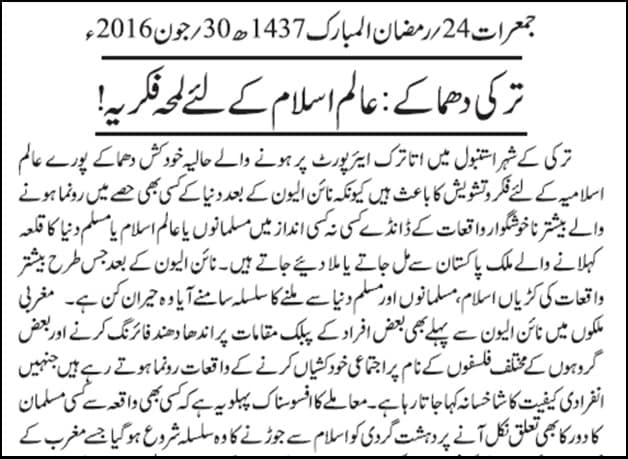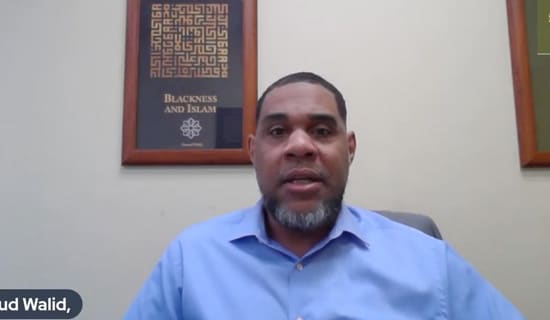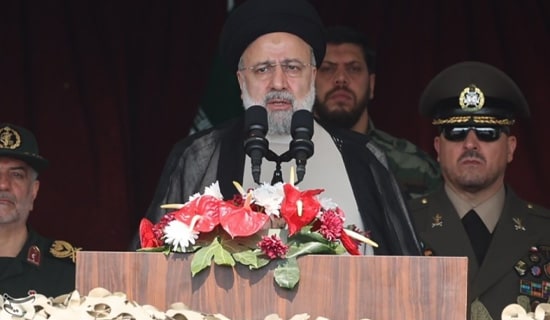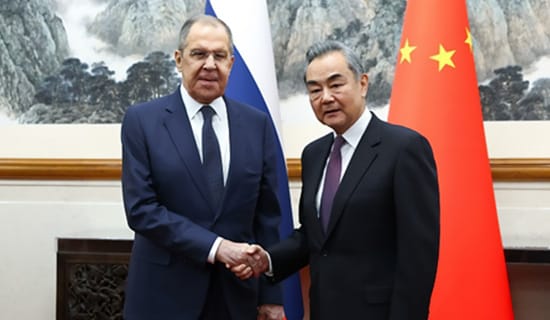
Following the June 28 triple suicide bombing at Istanbul's Ataturk Airport, which killed 41 and injured more than 200, Pakistan's largest Urdu-language daily Roznama Jang, published an editorial titled "Turkish Attacks: A Time of Alarm for the World of Islam!"
In the editorial, the daily insinuated that these attacks, as well as similar incidents that have occurred since 911, are part of a plot by Western countries. The editorial claims that after the defeat of the Soviet Union in Afghanistan, the then-NATO secretary-general (whose name is not given) had issued a policy statement saying that after communism, it was now Islam's turn to be defeated.
Following are excerpts from the editorial:
"The recent suicide attacks that took place at the Ataturk airport in the city of Istanbul, Turkey are a cause for concern and worry for the entire world of Islam. This is because most of the unhappy incidents occurring in any part of the world since 9/11 are connected in some manner or another to Muslims, the world of Islam, or Pakistan, which is known as the fort of the Muslim world. After 9/11, the way most incidents have been linked to Islam, Muslims, and the Muslim world is a matter of amazement.
SUPPORT OUR WORK

"In Western countries, even before 9/11, there had been incidents of indiscriminate shooting in public places by some individuals or [incidents] of collective suicides in the name of different philosophies by some groups, which were described as isolated incidents. The sad fact of the matter is that if a remote link between a Muslim and any incident emerged, it led to a series [of attempts] to connect Islam to terrorism; [attempts] that are seen with increasing suspicion, even by the educated class in the West.
"Some individuals who study history say that after the break-up of the Soviet Union, the then-NATO secretary-general issued a policy statement declaring Islam as their next enemy after the defeat of Communism. Subsequently, startlingly clear signs of sectarianism and differences based on language and race emerged in Muslim countries. Situations including corruption, mismanagement, lawlessness, the growing gulf between the rich and the poor, scarcity of energy, and shortages in agricultural and industrial production, emerged, leading to the public losing confidence in the system in most of Muslim countries.
"In Pakistan's Northern Areas, especially Swat and Malakand Agency, efforts to turn people's deprivations into religious slogans and religious extremism came to light. Through armed individuals [i.e. terrorists] coming from or brought from Afghanistan, attempts were made to weaken Pakistan's control in these areas once again. Though peace and order has been established in Swat through military operations, the anti-Pakistan activities of [Tehreek-e-Taliban Pakistan chief] Fazlullah, the rebel enjoying the safe hospitality in Afghanistan, are still continuing.
"The strange point is that on the one hand, both old and new terrorist organizations spend all their energy causing damage to Muslim countries in every way; but on the other hand, the blame for terrorism also falls on Muslim countries. As per preliminary reports, the three suicide attacks on the night between Tuesday and Wednesday at the Istanbul airport killed 36 and injured 150, and these numbers are expected to increase.
"On Tuesday alone, reports say: 14 worshippers were killed after the Tahajjud [Ramadan nightly prayers] in a mosque in Zaydan near the Iraqi capital of Baghdad; 11 Kurdish fighters and three [Iranian] Pasdaran-e-Inquilab [fighters] were killed during clashes in the Iranian province of Kurdistan near the Iraqi border; 25 rebels were killed in airstrikes by Saudi allies in Yemen; 40 individuals were killed during clashes between rebels and government forces in South Sudan.
"The countries of the Muslim Ummah - most of which were caught in the bonds of slavery at the beginning of the 20th century - are divided into pieces today despite being independent and autonomous and are undergoing the most difficult circumstances. It is the responsibility of Muslim rulers, Islamic scholars, philosophers, and reformers to set aside their personal, familial, and group interests, and organize and unite to sustain the freedom of Muslim countries and to save the world from a new war..."[1]
Endnote:
[1] Roznama Jang (Pakistan), June 30, 2016.




